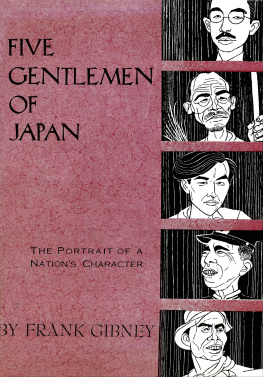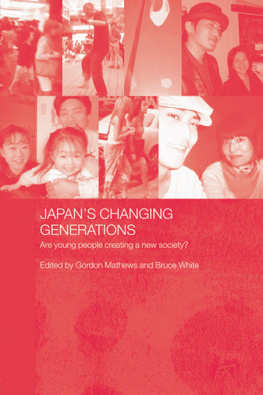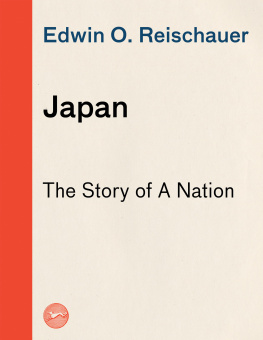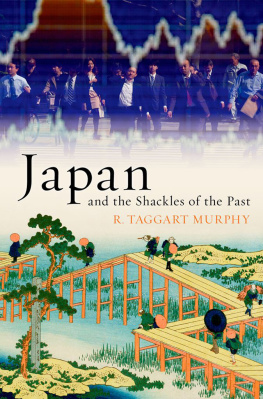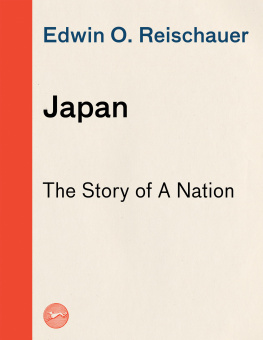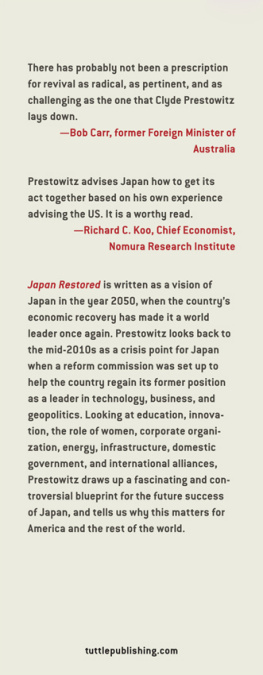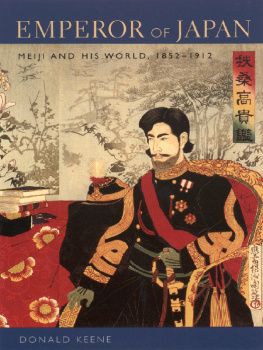ACKNOWLEDGMENT
In writing this book, I have drawn on my own experience as a correspondent in Japan, as well as my contacts with Japanese both before and after this period. I have read many books and picked many brains. It would be impossible to acknowledge, singly, each author and each acquaintance from whom I have learned. I am especially grateful for the work of two fine scholars, Sir George Sansom, at present head of the East Asian Institute of Columbia University, and Mr. Herbert Norman, of the Canadian Department of External Affairs, for their studies on the Meiji period.
I am indebted most of all to two members of the Time and Life bureau in Tokyo, Mr. Kay Tateishi and Mr. Frank T. Iwama. They are responsible for a great deal of the research done in preparation for this book, and their counsel and wide knowledge of Japanese history and customs were of continual help to me. Without their assistance, this book would have been impossible.
The editors of Life suggested, in the first instance, that I write a long article on Japan for them. This article, which appeared in September, 1951, contained the germ of the present book. I am grateful for their suggestion, and for the encouragement given me in putting it into actuality. I thank my publishers, also, for the cooperation they showed while the book was in the writing. Before coming to their offices, I had not thought that a man writing a book could expect such generous and intelligent treatment.

THE WEB
"These are the best people so far discovered, and it seems to me that among the unbelievers no people can be found to excel them."
St. Francis Xavier's Report on Japan
"The gentlemen of Japan were most polite and courteous, conducting themselves with refined and polished urbanity."
Captain of H.M.S. Samarang, 1845
Up the road from Yokohama to Tokyo, past the burned-out husks of Kawasaki's bombed factories and the rising furnaces of new ones, through the depressing ramshackle of Japanese souvenir shops and an American drive-in, speeds a severe gray Cadillac with a modest police escort. Pedestrians along the route notice the car as it sweeps over a road temporarily cleared of other traffic. Some bow deeply. Others smile or even wave. The man inside the car, a slightly stooped, mustached gentleman of middle age, wearing a crushed brown hat, nods jerkily in acknowledgment. He is His Imperial Majesty Hirohito, 124th Emperor of Japan.
The new Cadillac with the imperial crestor the older Mercedes which the Royal Family also usesare no longer rare sights on Japanese roads. For the moment, at least, the car is a better symbol of Hirohito's role than his moated palace in Tokyo, with the clumps of wisteria and cherry blossoms sparkling over its curved stone walls. He is a king who visits his people, still a semi-sacred object to most of them, but no longer the felt but unseen presence he once was. A kind and gentle man, the purpose of the change has appealed to him, but he is too shy to enjoy it. He has learned discipline as few men have, but poise he has never acquired.
He is a scientist by inclination, happiest when he is cataloguing specimens of marine biological life in his small laboratory inside the palace grounds. It is exhilarating to narrow the scope of his concentration so in private, a retreat from a public life where the parchment of an imperial rescript or the shading of an imperial gesture may have far-reaching and possibly uncontrollable effects on some 85 million people.
His wife, the Empress Nagako, is an affectionate, rather talkative woman with far more natural ease of manner than he. She has helped him. With their five children, they can sometimes enjoy a home life that gives at least a tiny compensation for the wearing job of being an earnest, intelligent cynosure. But even family life is hopelessly circumscribed by court chamberlains and an attendant bureaucracy, part of the swarm of faceless officials who have historically run the machinery of the Japanese state. It is probably only in the laboratory that Hirohito can be an unaffected identity, in the quiet, decently cluttered room dominated by the busts of Darwin, Lincoln and NapoleonDarwin chosen for his science, Lincoln for his humanity and Napoleon simply because many years ago a crown prince of Japan, on a visit to Europe, spent a few hours of solitary shopping in Paris. The bust, found in an antique shop, is almost the only purchase he ever made by himself.
* * * * *
Tadao Yamazaki is approaching downtown Tokyo from another direction. A tall young man with a thick shock of hair and a thin, pale artist's face, he is jammed in one of the bulging cars on a commuter's train of the Tokyo Kyuko Kabushiki Kaishathe municipal railway line. On the outside of the cars the initials of the company are painted in large yellow Roman lettersT.K.K. Tokyo people like Yamazaki, who have to imprison themselves in the T.K.K.'s run-down rolling stock for upwards of an hour and a half each day, have their own slogan for the initials "Totemo Konde Kuru Always crowded, always coming."
At the Tsukiji Station Yamazaki gets off and walks a few blocks to the rotund eight-story building that houses the Tokyo staff of Asahi, Japan's largest newspaper. Six days a week he goes up the scuffed stairs to his desk in the third-floor editorial rooms. There he works as a rewrite man on the city edition, a position of some responsibility in a newspaper with a 3,600,000 circulation. Barring the excessive crowding and signs written in unfamiliar characters, the atmosphere around him is one that an American reporter might feel at home inasthmatic typewriters, littered papers, too many people for too few desks. Only the teacups on editorial desks and the odd clickety-clack of the abacuses in the accounting department provide a touch of Japanese background.
Yamazaki has a wife, Matsui, who was herself a reporter before her marriage, and a small, fourteen-month son, whom they have named Akito. In his home and in his work he is a happy man. He has already worked for Asahi for five years, and done very well as a reporter. He is outspoken without being impolite, a good student who has not let his scholarship get in the way of his reporter's nose for news. Still, other Japanese would call him an "interi"an intellectual. He is less interested in day-to-day news-breaks than in probing the respective verities of Marx, Jefferson, Keynes and Sidney Webb. The future of the Japanese, he and his friends speculate, depends on how well they can absorb and adapt all of these men's teachings.
* * * * *
There is not much time for speculation in Yahata, Kyushu. Hideya Kisei, a small, round-faced man of thirty-three, is a gang foreman at the Number 2 Furnace of the Kukioka Plant, Yahata Steel Works. He got his first job in the mill at fifteen. Since then, except for two periods of military service, he has spent almost every day of his life in the sooty atmosphere of Yahata, a gray and brown industrial city at the northern tip of the island of Kyushu, whose massed smokestacks pour their film over the green and yellow of the surrounding farm country.
Kisei is a quiet, stubborn man with wide interests and some strong convictions. After the war he helped organize the Kukioka branch of the All Japan Steel Workers Union. For a while he served as its chairman. He is a Socialist, earnestly interested in world peace and international cooperation, and disturbed by the drawn battle lines of the democracies and the Communist countries. He reads what he can to try to explain things to himself, but the exhausting job he has is too taxing for much intellectual study after work. Lately he has complained that he can no longer remember things easily. He is afraid that the years spent near the 1,300-degree heat of the furnace have permanently weakened his powers of concentration.

